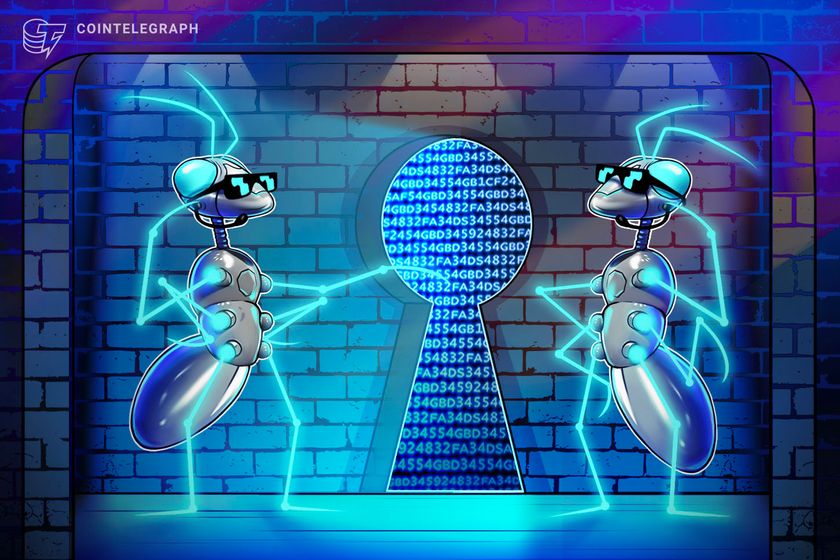
Opinion by: Eran Barak, CEO at Midnight
It’s been virtually 16 years since blockchain emerged from its esoteric fringes to enter international discourse, evidenced most lately by continued backing from Wall Avenue incumbents. Regardless of this outstanding ascendancy, the unlucky reality is that this know-how has but to appreciate its true enterprise potential. A core problem persists: An excessive amount of delicate information stays publicly unshielded.
The crux of the problem is that firms should hold enterprise information confidential, and folks try to safeguard their private info as greatest they’ll. As soon as information is placed on a public blockchain, nevertheless, it turns into irreversibly and indefinitely uncovered.
Even when a enterprise takes each potential precaution to hide information, errors made by others or vulnerabilities within the system can expose delicate onchain information or metadata, together with members’ identities. This may result in privateness breaches, compliance violations or each, undermining the foundational assumption that blockchain is trusted and underscoring the significance of strong measures to guard delicate information.
On the opposite facet of that coin, concealing exercise on a blockchain can open the door to cash laundering, triggering destructive authorities responses. Situations wherein this has occurred have led to a misunderstanding that governments oppose Web3 privateness, a criterion companies basically want for them to undertake the know-how.
From whichever angle we take a look at it, sustaining privateness onchain is an actual and complicated situation for Web3. Till we resolve it, companies won’t and shouldn’t be anticipated to cross the chasm.
The assumption that governments oppose privateness on the blockchain is fallacious
Web3 entrepreneurs have grown to worry that constructing decentralized purposes and companies that present monetary anonymity might land them in regulatory hassle. Simply take a look at Samourai Pockets, whose co-founders were charged with money laundering, or Twister Money, whose developer was sentenced to 64 months in prison for related causes.
These responses have led to a consensus that governments are against privateness altogether with regards to blockchain.
Current: AI agents and blockchain are redefining the digital economy
This couldn’t be farther from the reality. Governments don’t oppose privateness however mandate it throughout industries. Knowledge safety legal guidelines, just like the Basic Knowledge Safety Regulation or the Well being Insurance coverage Portability and Accountability Act, are in place to make sure companies shield our buyer information from misuse and safety threats.
The actual situation these high-profile circumstances reveal is that Web3 measures to guard information have created alternatives for misuse, enabling the facilitation of prison actions which have understandably raised critical considerations on behalf of governments. Blockchain information safety capabilities shouldn’t undermine established cross-jurisdictional legal guidelines safeguarding the worldwide neighborhood from terrorism, human trafficking, fraud and different prison offenses.
This begs the query: What does privateness, performed proper, seem like?
Selective disclosure
In terms of utilizing blockchain, defending delicate information is often achieved by both protecting the info offchain, or encrypting information onchain. The latter is just not sturdy privateness given quantum computing’s fast advances in cracking encryption.
The appearance of zero-knowledge (ZK) know-how, a fancy cryptographic approach, permits customers to make sure delicate information stays offchain by sharing attestations in regards to the validity of the info as a substitute. In Web3, ZK has emerged as a transformative strategy to improve privateness because it allows untrusted events to validate {that a} transaction has occurred with out sharing any details about the transaction.
Decentralized purposes can train selective disclosure by selecting between placing information onchain (full disclosure), placing it onchain with encryption (disclosure through viewing keys) or utilizing ZK to solely publish attestation in regards to the information (providing utility with none disclosure). Selective information disclosure solely solves half of the puzzle. It was not designed to account for metadata.
The subsequent privateness frontier
Metadata, the data surrounding our information, is an under-discussed element of blockchain’s publicity of delicate info; it may be used to make inferences, creating an added layer of vulnerability even when the info itself is hid.
For instance, by transaction metadata, funding and buying and selling methods may be inferred along with different behavioral patterns. For companies, the implications of this may be detrimental to their development and skill to remain forward of opponents. They’ll’t afford to have commerce secrets and techniques and techniques, and even the identities of different events they’re transacting with, made public.
The necessity to shield metadata and take away the power to make inferences is paramount to safety and may be addressed utilizing a personal token. Such functionality can, nevertheless, be simply misused for cash laundering.
If utilizing a personal token is just not the answer, and utilizing a public token doesn’t present ample ranges of confidentiality, then the best way to unravel this problem is to rethink Web3’s method to defending metadata altogether. We have to mix the advantages of each approaches, successfully making a dual-asset system wherein a public and a personal token are used. Every asset capabilities independently, that means particular restrictions may be positioned to stop illicit actions similar to cash laundering whereas retaining all the advantages.
A robust framework
The twin-asset system allows confidentiality with out the illnesses shielding metadata normally brings, making compliance and enterprise coverage enforcement potential. By combining this tokenomics construction with selective disclosure, privateness and regulatory compliance can coexist on the blockchain, which may have resounding results on adoption and innovation.
Opinion by: Eran Barak, CEO at Midnight.
This text is for basic info functions and isn’t meant to be and shouldn’t be taken as authorized or funding recommendation. The views, ideas, and opinions expressed listed here are the creator’s alone and don’t essentially replicate or symbolize the views and opinions of Cointelegraph.












